Buddhist Sets Himself on Fire in Ancient Greece? March 16, 2018
Author: Beach Combing | in : Ancient
Say it quietly, but there is a strong case to be made that, a score of years before Christ was born, a Buddhist monk came to Greece and set himself on fire in a public display of piety. Sources c. 20 BC an Indian embassy made its way into the Mediterranean to pay tribute to […]
Chinese Artillery Outside Baghdad January 20, 2018
Author: Beach Combing | in : Medieval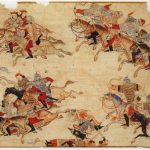
The Mongol armies of the thirteenth century were among the most multi-ethnic in history. Koreans, Africans, Europeans and Persians fought together under the ‘prince of heaven’: a thuggish horse thief from the Steppes. Beach was recently particularly struck by one example of this that could stand for many less dramatic instances. When in 1258 Hulegu […]
Ostrich in Medieval China November 19, 2017
Author: Beach Combing | in : Medieval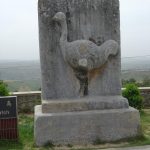
Chinese Ostriches The Qianling Mausoleum was used for three hundred years (from the seventh to the very early tenth century) by Tang dynasty emperors and their court officials. It includes, in some of its magnificent stone sculptures, a large flightless bird, pictured above. This bird is clearly an ostrich, which begs a number of questions. […]
Thirteenth-Century Eurasia April 8, 2017
Author: Beach Combing | in : Medieval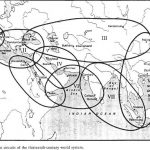
In 1989 Janet Abu-Lughod published her Before European Hegemony. In a series of graphics and discussions she attempted to map out not the trade routes, but the trade zones (‘trade circuits’) that divided up Eurasia and, indeed, Africa to the north of the Sahara and down the Horn. As with many bold economic books, these […]
Redhead the Lost Spaniard February 8, 2017
Author: Beach Combing | in : Modern
Get ready a human flotsam and jetsam story. A few months ago Beach introduced the Itza, the last independent Indian state in the Americas. The Itzas held out against the Spanish in Guatemala until 1697, a remarkable achievement. When he was looking through the sources he ran across the following reference in Jones, The Conquest of […]
In Search of Crimean Gothic November 4, 2016
Author: Beach Combing | in : Medieval, Modern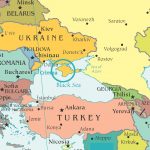
Crimea is the Ukrainian or Russian peninsula that stretches down into the Black Sea and whose large bays make it resemble a famished fish about to eat a smaller prey. Crimea’s geography has made it a natural place for enclaves. In ancient times, the Greeks and Romans held colonies here, as did the Byzantines and Genoese in […]
Gonzalo Guerrero: the Spanish Mayan November 2, 2016
Author: Beach Combing | in : Modern
Gonzalo Guerrero was an obscure Spaniard who played several interesting roles in his life. He was, in chronological order: a poor Andalusian; a servant of the Spanish crown; a Mayan sacrificial victim; an escapee; a Mayan slave; a Mayan war leader; a Mayan father and husband; and, finally, (if we can believe the stories) food […]
Chinese in Roman London? October 2, 2016
Author: Beach Combing | in : Ancient
Chinese in Roman London? It is well known that the Roman empire was a cosmopolitan place, even a tedious, sorry backwater like Britannia. The combination of soldiers, slaves and solid economic infrastructure meant unprecedented movement of individuals. However, what about the history story of the week, the claim that two Chinese bodies have been dug […]
Wrong Time Bread, Wrong Place Fairies September 19, 2016
Author: Beach Combing | in : Contemporary, Modern
Beach wants to introduce today a folklore custom that survived unexpectedly for three hundred years in the dark, before emerging to be briefly photographed by stunned folklorists at the end of the twentieth century. The tradition in question relates to bread. It was believed in south-west England in the 1600s that if you carried bread […]
Arab Embassy to Dark Age Scandinavia July 19, 2016
Author: Beach Combing | in : Medieval
The Vikings were attacking everyone in the ninth-century and this included the Arabs of southern Spain. After their most famous raid, in 844, when Seville was memorably captured by those northern psychos, the Emirate of Seville did something quite extraordinary. He decided to send an embassy to the Viking homelands to buy them off. This […]
The Furthest Viking Raid June 21, 2016
Author: Beach Combing | in : Medieval
From the very late eighth century Scandinavians left their homelands to raid. These raiders were called vikings and historians usually capitalize the word to give us the Vikings: pagan crusaders out for money, slaves, blood and saga-glory. They began with what was close at hand, the northern islands (Shetland, Orkney etc), then they moved onto […]
Is St Francis’ Horn Egyptian? April 20, 2016
Author: Beach Combing | in : Medieval
A medieval ivory horn is pictured with two mysterious wooden rods, which look like nunchaku, but were actually ‘silence sticks’, banged together before a sermon. The horn is kept at Assisi among the most precious relics of St Francis (obit 1226), because this horn, says tradition, was brought back by Francis from Egypt as a […]
Greeks in Buddhist India? March 20, 2016
Author: Beach Combing | in : Ancient
Basnagoda Rahula argued in his doctorate, written in sometimes shaky English, but full of fascinating ideas, for wholesale Indian influence on Greek culture and above all, Greek philosophy. The arguments are exciting but annoyingly insubstantial: no fault of BR, of course. It would be exciting to have some kind of outside input into the beginning of […]
The Durham Serpent May 19, 2015
Author: Beach Combing | in : Modern
Here is a weird little story that allegedly appears in St Nicholas’ Parochial Register, Durham for 1568. Mdm. that a certain Italian brought into the cittie of Durham, the 11th day of June, in the yeare above sayd, a very great strange and monstrous serpent, in length sixteen feet, in quantitie and dimentions greater than a […]
Canary Slaves in the Arab World April 17, 2015
Author: Beach Combing | in : Medieval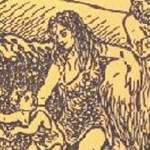
It is sometimes said that the furthest travelled people in the ancient and medieval world were slaves. Consider four points. First, average men and women were not foolish enough to pass beyond the frontiers. Second, when they were foolish enough to travel they often risked becoming slaves (St Patrick, Frumentius… there are many examples). Third, […]


